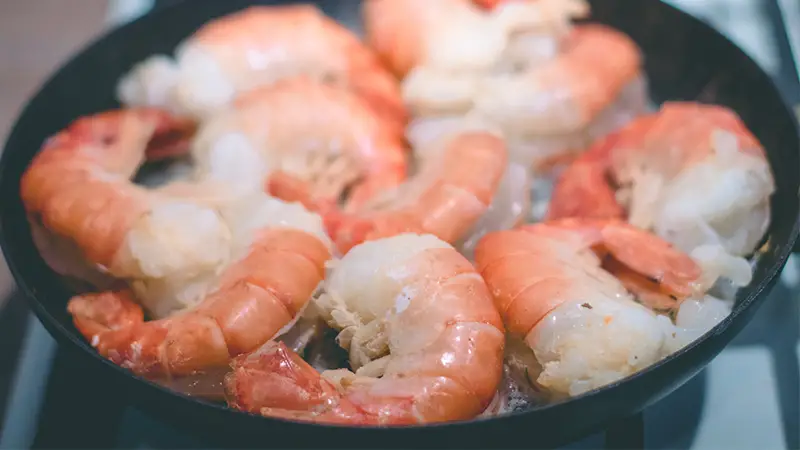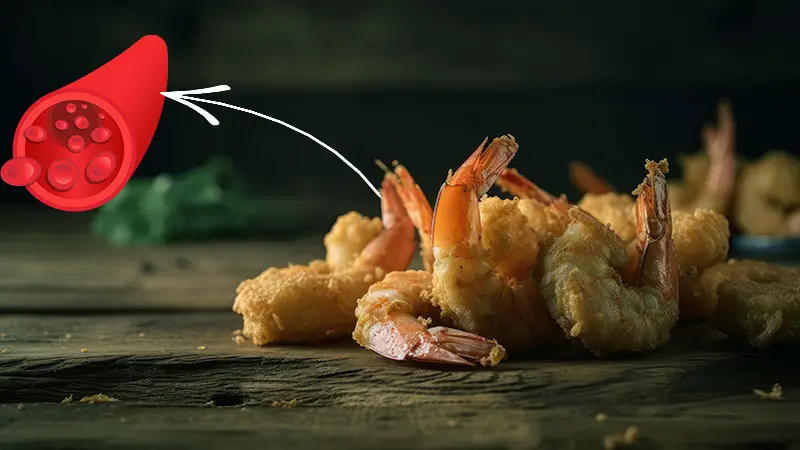Shrimp, a beloved seafood delicacy enjoyed in various culinary creations around the world, often raises questions due to its high cholesterol content.
Many individuals wonder why this flavorful crustacean has so much cholesterol and what implications it holds for our diets and overall health.
The answer lies in the nature of shrimp and its biological makeup. Shrimp naturally contain cholesterol as part of their cellular structure, which influences the cholesterol levels they provide when consumed.
However, understanding this doesn’t provide the complete picture. It’s crucial to examine the broader context of dietary cholesterol and its impact on our health.
In this exploration, we delve into why does shrimp have so much cholesterol, shedding light on the complexities of cholesterol in our diets and what it means for our well-being.
Why Does Shrimp Have So Much Cholesterol?
Shrimp, a popular seafood choice, is often criticized for its high cholesterol content. However, there are several reasons for this:
Natural Cholesterol
Shrimp, like all animal products, naturally contains cholesterol. The cholesterol content varies depending on the size and type of shrimp, but it is generally higher than that of other seafood.
Dietary Cholesterol vs. Blood Cholesterol
It’s important to distinguish between dietary cholesterol and the cholesterol that circulates in our blood. Consuming dietary cholesterol, like that in shrimp, has less impact on blood cholesterol levels than saturated and trans fats.
Saturated Fat
While shrimp has cholesterol, it is relatively low in saturated fat, which is a more significant contributor to elevated blood cholesterol levels. In fact, shrimp is lower in saturated fat than some other animal proteins.
Monounsaturated Fats
Shrimp contains monounsaturated fats, which can help raise HDL (high-density lipoprotein) cholesterol, the “good” cholesterol, potentially balancing the impact of its cholesterol content.
Nutrient Density
Shrimp is a nutrient-dense food, providing protein, vitamins, minerals, and omega-3 fatty acids. These beneficial nutrients offer health advantages that may outweigh the cholesterol content.
Preparation Method
How shrimp is prepared significantly impacts its overall health. Frying or cooking with excessive butter and oils can add saturated fats, which should be limited.
Individual Responses Vary
People respond differently to dietary cholesterol, and genetics play a role. Some individuals may be more sensitive to the dietary cholesterol found in shrimp, while others may not experience a significant impact on their blood cholesterol levels.
In summary, while shrimp does have a relatively high cholesterol content, it is important to consider the overall nutrient profile and preparation methods.
For most people, including shrimp in a balanced diet is unlikely to have a substantial negative impact on their cholesterol levels, especially when prepared in a heart-healthy way.
It’s essential to discuss dietary choices with a healthcare provider, especially if you have specific cholesterol concerns.
What Kind Of Cholesterol Does Shrimp Have?

Shrimp primarily contain dietary cholesterol, also known as dietary cholesterol or exogenous cholesterol. This type of cholesterol is found in the foods we eat, like animal-based products, including seafood, meat, and dairy.
The cholesterol in shrimp is a part of their cellular structure and is naturally occurring. Dietary cholesterol is distinct from the cholesterol our bodies produce internally, known as endogenous cholesterol.
When we consume foods like shrimp, the dietary cholesterol is broken down during digestion, absorbed by our intestines, and then enters our bloodstream.
It’s important to note that dietary cholesterol has less impact on our blood cholesterol levels compared to saturated and trans fats in our diet. For most people, dietary cholesterol from shrimp or other sources is not a major contributor to elevated blood cholesterol.
However, individual responses to dietary cholesterol can vary, so it’s advisable to consider the overall balance of nutrients in your diet and speak with a healthcare provider if you have specific cholesterol concerns.
What Risks Can Be Caused For Eating Shrimp If I Have Cholesterol Issues?

While shrimp is a delicious and nutritious seafood option, individuals with cholesterol issues may need to be mindful of potential risks associated with its consumption:
Elevated LDL Cholesterol
Shrimp is relatively high in dietary cholesterol, which can contribute to elevated LDL (low-density lipoprotein) cholesterol levels in some individuals. Elevated LDL cholesterol is associated with an increased risk of heart disease.
Saturated Fat Content
While shrimp is low in saturated fat compared to some other animal proteins, it does contain some saturated fat. Individuals with high cholesterol should limit their intake of saturated fat, as it can raise LDL cholesterol.
Preparation Methods
The way shrimp is prepared can significantly impact its health. Frying or cooking with excessive butter and oils can add saturated fats, which can further increase cholesterol levels.
Total Dietary Cholesterol Intake
In some cases, individuals with cholesterol concerns may need to monitor their overall dietary cholesterol intake, and shrimp can contribute to this. It’s essential to consider the cumulative impact of cholesterol-rich foods in the diet.
Individual Sensitivity
People’s responses to dietary cholesterol can vary. Some individuals are more sensitive to dietary cholesterol, experiencing a greater impact on their blood cholesterol levels compared to others.
Underlying Health Conditions
Individuals with diabetes or metabolic conditions may be more susceptible to the adverse effects of dietary cholesterol. Shrimp consumption should be considered in the context of overall dietary recommendations provided by a healthcare provider.
Medication Considerations
For those taking cholesterol-lowering medications, the dietary cholesterol in shrimp may be less of a concern. However, it’s crucial to discuss dietary choices, including shrimp consumption, with a healthcare provider to ensure a comprehensive approach to cholesterol management.
While shrimp can be a part of a heart-healthy diet, individuals with cholesterol issues should be mindful of portion sizes, preparation methods, and overall dietary cholesterol intake.
Balancing shrimp with other heart-healthy foods, such as fruits, vegetables, and whole grains, and seeking guidance from a healthcare provider can help mitigate these potential risks.
What Other Seafood Has High Cholesterol?

Several seafood options contain higher levels of cholesterol compared to others. Here are some seafood choices with higher cholesterol content:
Crab
Crab is known for its relatively high cholesterol content. A three-ounce serving of crab can contain about 50-60 milligrams of cholesterol. While it’s a source of lean protein and essential nutrients, individuals with cholesterol concerns should consume crab in moderation.
Lobster
Lobster, another popular seafood delicacy, can also be higher in cholesterol. A three-ounce serving of lobster typically contains 61 milligrams of cholesterol.
As with crab, it’s essential to enjoy lobster in moderation, especially if you’re managing cholesterol levels.
Squid (Calamari)
Squid, commonly enjoyed in various cuisines, has a moderate cholesterol content. A three-ounce serving of squid contains approximately 90 milligrams of cholesterol. While it offers other nutritional benefits, individuals with cholesterol concerns should be mindful of portion sizes.
Caviar
Caviar, made from fish eggs, is a luxury seafood known for its rich flavor and texture. It is notably high in cholesterol, with a single tablespoon of caviar containing around 94 milligrams of cholesterol.
Shrimp Paste
Shrimp paste is a common ingredient in many Southeast Asian dishes and is known for its potent flavor. It contains a significant amount of cholesterol and should be used sparingly, particularly by those with cholesterol issues.
Anchovies
While anchovies are often used as a condiment or flavor enhancer in small quantities, they contain a relatively high cholesterol content. A one-ounce serving of canned anchovies contains about 65 milligrams of cholesterol.
Fish Roe (Fish Eggs)
Fish roe, including the well-known salmon roe or “salmon caviar,” is another seafood rich in cholesterol. A one-ounce serving of fish roe can contain around 110 milligrams of cholesterol. It is often enjoyed as a delicacy in sushi and other dishes.
While these seafood options are higher in cholesterol, they also provide essential nutrients, such as protein and omega-3 fatty acids. Moderation and balance in seafood consumption are key for individuals concerned about their cholesterol levels.
Incorporating a variety of seafood, along with other heart-healthy foods, can help maintain overall health.
FAQs
Why does shrimp have such high cholesterol levels compared to other seafood?
Shrimp, like all animals, naturally contains cholesterol as a part of its cellular structure. This cholesterol content can vary depending on factors such as the type and size of the shrimp.
While shrimp’s cholesterol levels may seem high, it’s important to understand that dietary cholesterol from foods like shrimp affects our blood cholesterol differently than saturated fats and trans fats.
Does consuming shrimp significantly raise my cholesterol levels?
The impact of shrimp on cholesterol levels can vary among individuals. Dietary cholesterol from foods like shrimp has a less pronounced effect on blood cholesterol compared to saturated and trans fats.
For most people, moderate shrimp consumption is unlikely to significantly raise their cholesterol levels.
Can I include shrimp in my heart-healthy diet despite its cholesterol content?
Yes, you can include shrimp in a heart-healthy diet, but it’s essential to do so in moderation. Shrimp offers valuable nutrients like protein and omega-3 fatty acids.
Balancing shrimp consumption with other heart-healthy foods, such as fruits, vegetables, and whole grains, is a key approach to maintaining overall health.
Are there other seafood options with lower cholesterol content than shrimp?
Yes, several seafood options have lower cholesterol content than shrimp. Fish like cod, haddock, and flounder are typically lower in cholesterol. Opting for these seafood choices may be preferable for individuals who are particularly concerned about their cholesterol intake.
How can I prepare and enjoy shrimp in a heart-healthy way?
To enjoy shrimp in a heart-healthy manner, opt for cooking methods that use minimal added fats, such as grilling, broiling, or steaming. Avoid frying or heavy butter-based sauces.
Combine shrimp with a variety of vegetables and whole grains to create well-balanced and nutritious meals.
Conclusion
The high cholesterol content in shrimp is a natural aspect of this delectable seafood. While the dietary cholesterol in shrimp can be a concern for individuals with specific cholesterol issues, it’s essential to consider the broader context.
Dietary cholesterol from foods like shrimp has a different impact on our blood cholesterol levels compared to saturated and trans fats in our diet. In most cases, moderate consumption of shrimp as part of a balanced diet is unlikely to have a significant adverse effect on cholesterol.
It’s crucial for individuals to make informed dietary choices, seek guidance from healthcare providers when necessary, and focus on overall nutritional balance to promote good health.
Understanding the complexities of dietary cholesterol can help individuals make choices that align with their specific health needs and goals.
Hi, I’m Mark Pattinson and I’m a freelance personal trainer. I’ve been working in the fitness industry for over 10 years especially since I work with diabetes patients and I love helping people achieve their fitness goals. I believe that everyone can benefit from a good workout, and I’ll do everything to make sure you get the most out of your training.